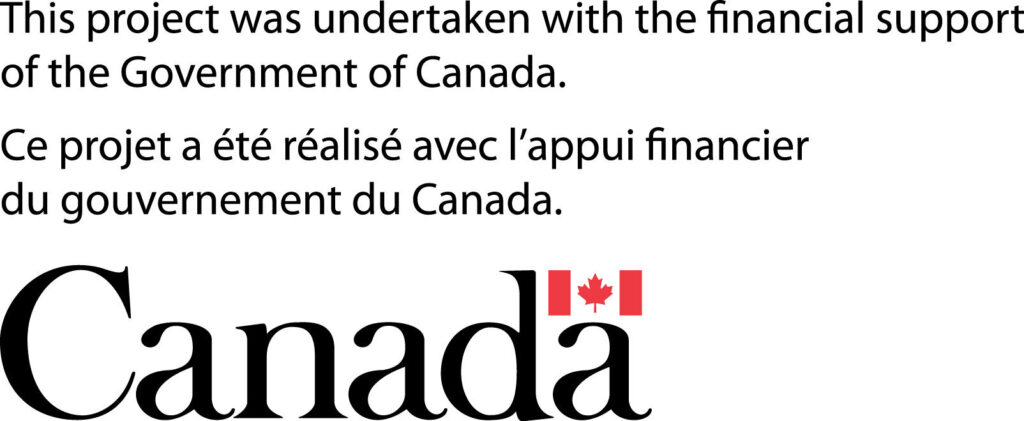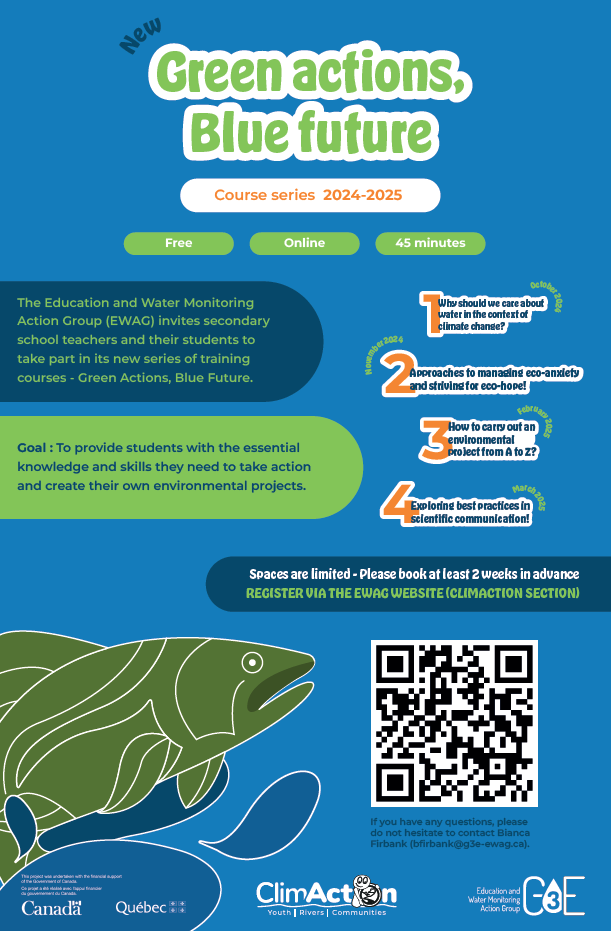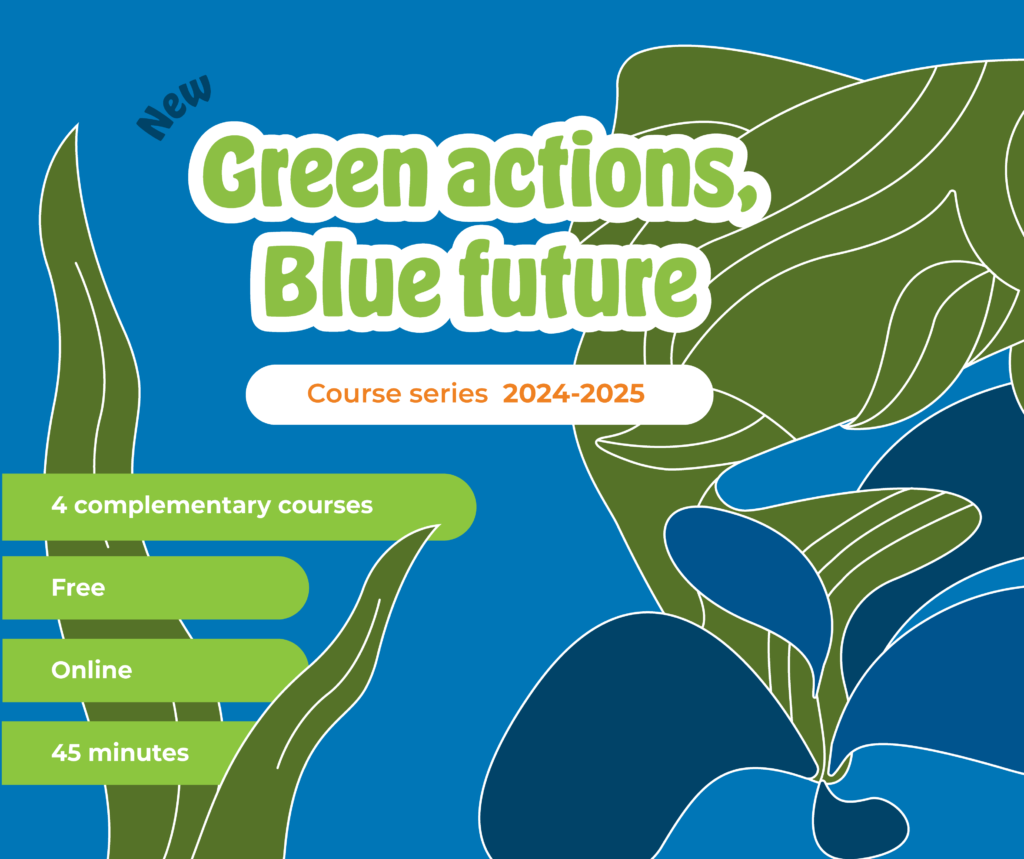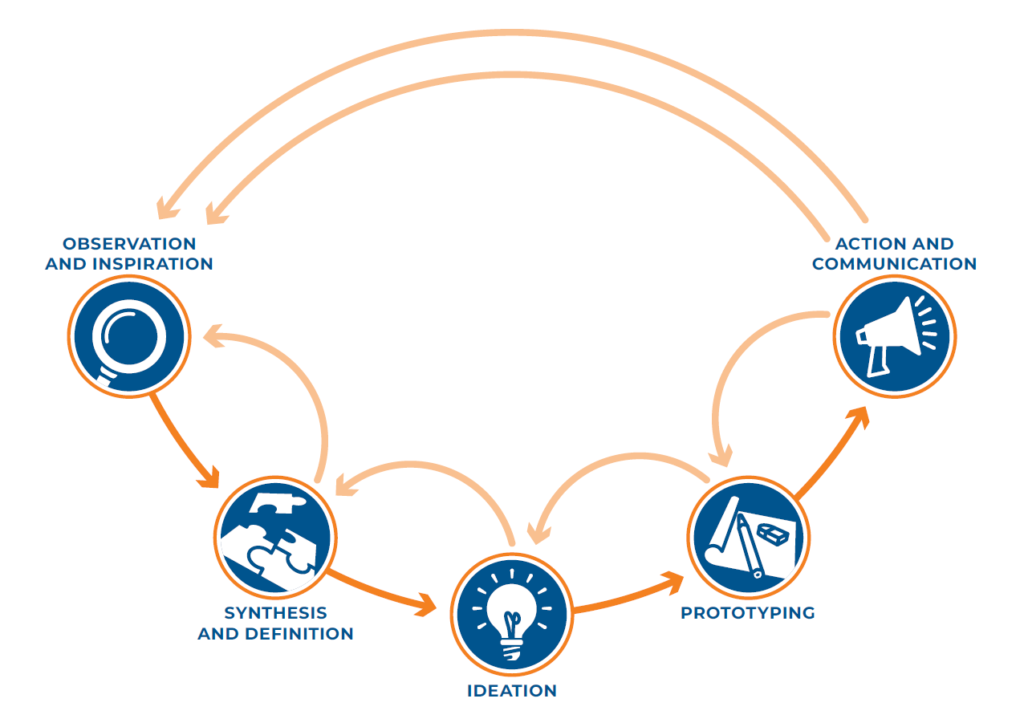
ClimAction is a citizen science educational project that assesses the impacts of climate change on small watercourses using the Adopt a River program’s tools. Students and their communities will develop climate change adaptation solutions using the pedagogical strategy of design thinking.
Through several workshops, from observation to prototyping, high school students from eight Canadian communities will determine an action to implement to help their watercourse adapt to the current and future climate context.
Green actions, Blue future course series
NEW! The EWAG invites secondary school teachers and their students to take part in its new series of free training courses Green Actions, Blue Future for the 2024-2025 school year.
This series aims to provide your students with the knowledge and skills they need to take action on their own environmental projects.
Update: Green Actions, Blue Futures course series
Missed the targeted month for a training course? No problem! Past training sessions are now available on demand. Contact us to schedule a time that works for your group and our facilitators.
Courses now available on demand:
- COURSE 1 – Why should we care about water in the context of climate change?
- COURSE 2 – Approaches to managing eco-anxiety and striving for eco-hope!
Practical Details:
- Offered online (no recordings available).
- Duration: 45 minutes per training session.
- Monthly scheduling: Each training is available for one month or on demand after the targeted month.
- Flexibility: Participate in one or more sessions. For a comprehensive experience, we recommend completing the full series of four trainings.
- No preparation required.
- Option to book for multiple groups at once.
Interested? Contact us now to reserve your spot!
Available by request - 2025
COURSE 1 - Why should we care about water in the context of climate change?
This first course immerses students in the impacts of climate change on our waterways! Discover the crucial role these ecosystems play in our daily lives and the importance of protecting them.
Available by request - 2025
COURSE 2 - Approaches to managing eco-anxiety and striving for eco-hope!
Awareness of the impacts of climate change on the environment can cause anxiety. This training course will provide students with a better understanding of these feelings and how to deal with them.
FEBRUARY 2025
COURSE 3 - How to carry out an environmental project from A to Z?
Are your students interested in taking steps to help the environment, but don’t know where to start? This course will provide them with the tools they need to take action, step by step!
MARCH 2025
COURSE 4 - Exploring best practices in scientific communication!
An important part of taking action is effectively communicating these efforts. This course explores how to make ideas accessible to the general public, how to target audiences of all ages and how to convey scientific information effectively.
Would you like to share the news?
You will find everything you need with our media kit below
Don't miss a thing about the project
What is design thinking?
It is an approach centered on people, including their behaviors and needs, which makes it possible to solve a multitude of problems, including environmental ones. This approach is a key element in ClimAction.
Here is an outline of the steps in this approach:
- Observation and inspiration: Scientific field trip (Adopt a River tools) and ethnographic survey (individual interviews with citizens).
- Synthesis and definition: Synthesis of data and definition of the challenge.
- Ideation: Formulation of numerous adaptation actions.
- Prototyping: Rapid construction of prototypes illustrating the solutions.
- Action: Planning, carrying out and communicating the action.
Why use design thinking?
Climate change is a complex issue that affects and will continue to negatively affect watercourses. This approach will allow participating students to take this complex problem and divide it into sub-problems on which they can act concretely.
G3E’s network of participants and collaborators
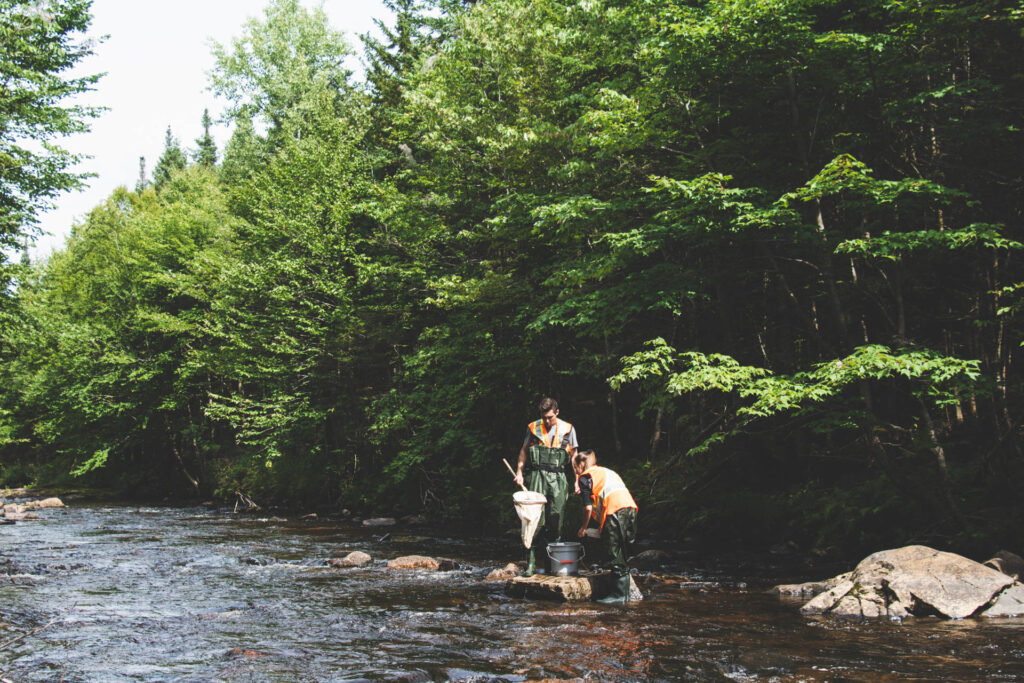
Regional coordinators
Each participating educational institution is supported by a regional coordinator, an environmental organization trained by G3E. The coordinator guides the teacher and students during the problem-solving workshops and the field trip.
Click here to see the regional coordinators!
- Division scolaire franco-manitobaine (DSFM)
- Organisme de bassin versant de la Yamaska (OBVY)
- Organisme de bassin versant Matapédia-Restigouche (OBVMR)
- Vision H2O
- Comité ZIP des Seigneuries
- Division scolaire franco-manitobaine (DSFM)
- Organisme de bassin versant de la Yamaska (OBVY)
- Organisme de bassin versant Matapédia-Restigouche (OBVMR)
- Vision H2O
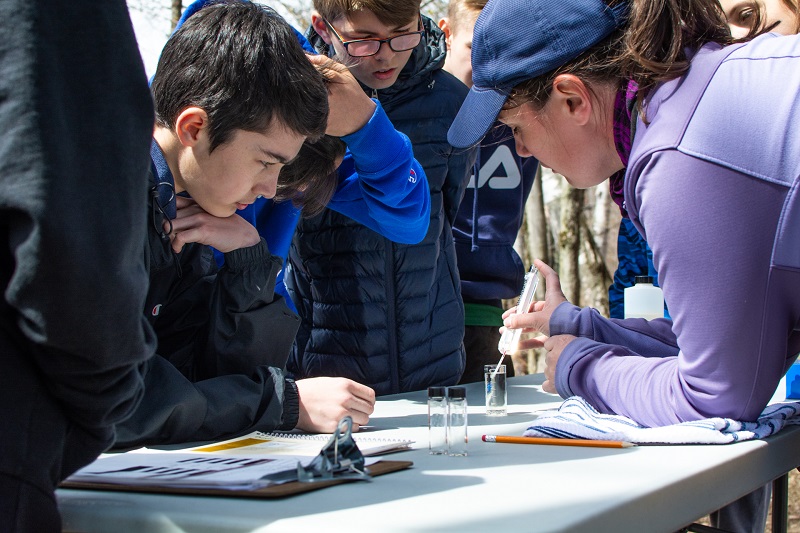
Educational institutions
In phase I of the project, eight educational institutions participate in data acquisition while developing knowledge about issues affecting rivers and finding solutions to protect these fragile ecosystems.
Click here to see the educational institutions!
- Collège Beaubois
- École des Deux-Rivières
- École Donat-Robichaud
- École secondaire Jean-Jacques-Bertrand
- Polyvalente de l’Ancienne-Lorette
- École des Deux-Rivières
- École Donat-Robichaud
- École La Source
- École secondaire de la Rive
- École secondaire Jean-Jacques-Bertrand
- École secondaire Louis-Joseph-Papineau
- New Richmond High School
- Polyvalente de l’Ancienne-Lorette
About ClimAction on our blog
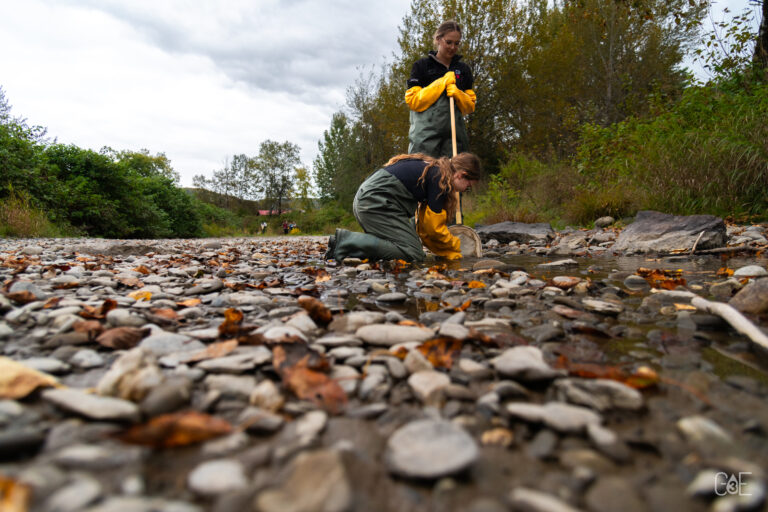
Un échantillonnage… sans eau!
À la fin du mois de septembre dernier avait lieu la sortie J’adopte un cours d’eau/ClimAction sur un bras de la rivière Matapédia, en Gaspésie,
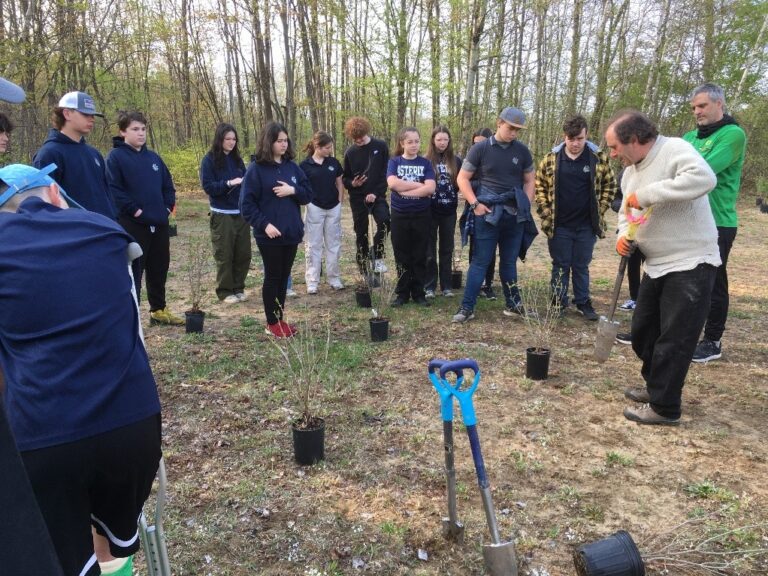
ClimAction | École Jean Jacques-Bertrand
Dès l’automne 2022, les élèves de l’école secondaire Jean Jacques-Bertrand de Farnham se sont impliqués avec beaucoup d’entrain dans la réalisation du projet ClimAction –
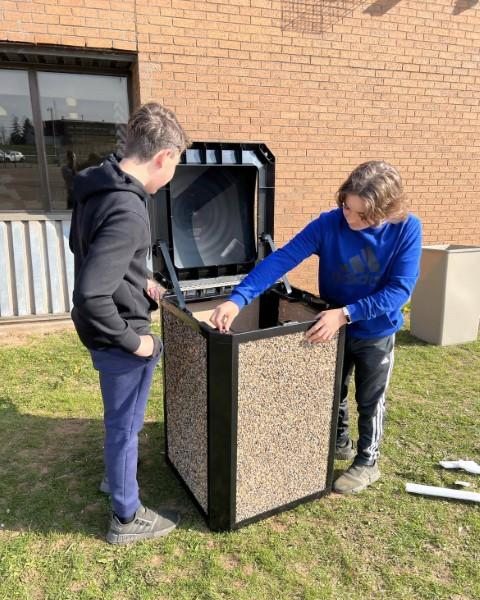
ClimAction | École Donat-Robichaud
Petit retour en arrière sur l’action des élèves participants au projet ClimAction – des jeunes, des rivières, des communautés de l’école Donat-Robichaud située à Cap-Pelé
Tools and ressources
Climate change, water and territory
In order to have English subtitles (automatically generated by YouTube), you must go to the video settings (gear icon next to the YouTube logo), click on “Subtitles/CC”, then click on “Auto-translate” to be able to choose the desired language.
Climate change and its impacts on waterways...
Conversation with Antoine Verville
Director of ROBVQ
Conversation with Céline Hudon
Laboratory technician
Conversation with Frédéric Lecompte
Scientific advisor
Conversation with Lyne Pelletier
Biologist
Climate change | Small gestures that make a difference
Droughts
Floods
Temperature rises
Biodiversity
Nature and its benefits on well-being
Watersheds
Partner
